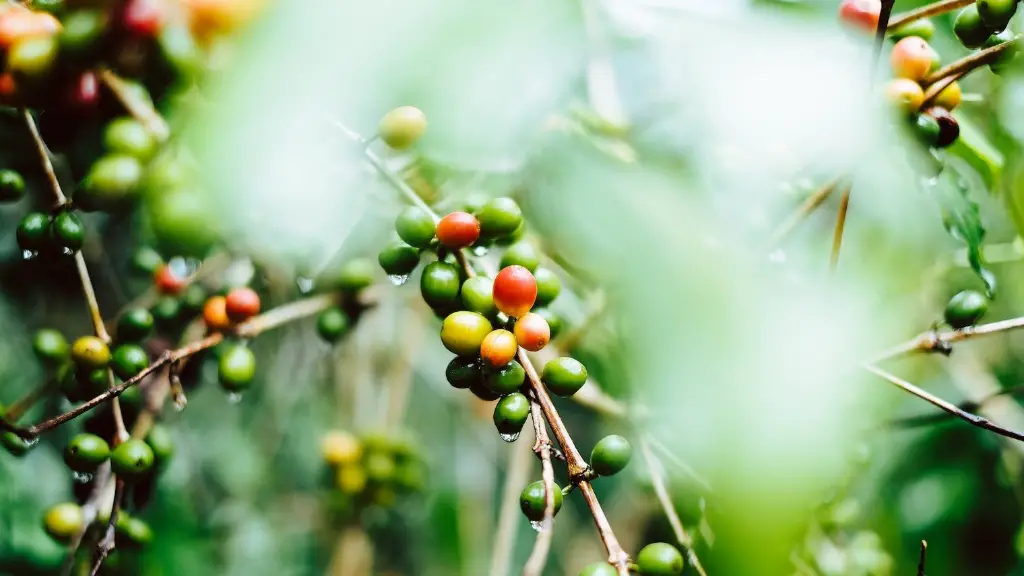Introduction
Coffee is one of the most popular beverages in the world, particularly among Americans. Most people rely on coffee to start their morning, give them an energy boost, or even to enjoy a moment of relaxation and tranquility. Every day, many American households brew a pot of coffee in their homes and many more pick up their daily caffeine fix from their local coffee shops. But just how much coffee do Americans consume every day?
Coffee Industry Growth
The coffee industry has grown exponentially in recent years. According to the National Coffee Association, over 64% of adults in America drink coffee daily, with an average consumption of 3.2 cups per day. This is considerably more than the global average, which stands at 2.7 cups per day.
It appears that coffee consumption is exponentially increasing in the United States, as the 2019 American Coffee Drinking Trends Report found that 58% of coffee drinkers consumed more coffee in 2019 than in the previous year.
Beneficial Effects of Coffee
Coffee consumption has long been associated with a host of health benefits. Regular consumption of coffee has been linked to several chronic diseases such as diabetes, heart disease, and cancer. Coffee has also been shown to boost cognitive performance and memory. According to a 2019 study, the caffeine content in coffee can help to improve energy levels and focus, as well as reduce the risk of depression.
Factors that Affect Coffee Consumption
Coffee consumption is largely dependent on lifestyle and demographic factors. For example, young people are more likely to drink more cups of coffee every day than older people. A study from the National Coffee Association found that millennials, in particular, tend to drink more coffee on a daily basis than their older peers.
Workplace culture can also play a major role in coffee consumption. Research suggests that people who work in an office environment with a coffee culture are more likely to consume more coffee daily than those who work in environments with no established coffee culture.
Geographical Variation in Coffee Consumption
Coffee consumption is highly variable across the United States. According to the National Coffee Association, some states like Massachusetts and Rhode Island rank higher in coffee consumption than others, with residents of these states consuming more than 4 cups of coffee each day on average. In contrast, the citizens of states like Minnesota, Montana, and South Dakota consume an average of less than 3 cups per day.
Effects of Coffee on Sleep
Though coffee can benefit cognitive performance and energy levels, it can also affect sleep if consumed in excess. Caffeine blocks the production of adenosine, a hormone that helps induce sleep. Therefore, consuming too much coffee can disrupt sleep cycles, leading to insomnia, fatigue, and other sleep issues.
Coffee Alternatives
Though coffee is the most popular caffeine source in America, there are other options for those who wish to reduce their coffee intake. Some of the most popular alternatives include herbal teas, energy drinks, and sodas. These drinks often contain less caffeine than coffee, making them more suitable for those who wish to cut down their caffeine intake but still need an energy boost.
The Social Aspect of Coffee
Though coffee can be a great pick-me-up, it is also a tool for socializing and connecting with people. Many Americans see coffee as a relaxing break in their day and an opportunity to spend time with friends, family, or colleagues. According to a survey by the National Coffee Association, over 90% of people who consume coffee every day also enjoy going to coffee shops with friends.
Coffee Consumer Profile
When it comes to coffee consumption, there is no one-size-fits-all profile. Studies show that coffee drinkers come from all walks of life, with different tastes and preferences when it comes to their coffee. While some prefer strong, dark coffee, others lean towards milder, creamier varieties. Some prefer plain black coffee while others prefer their coffee with milk, sugar, or other additives.
Market Trends
The coffee market has seen many changes in recent years. The trend towards specialty coffee, including cold brews and flavored coffees, is growing. Health-conscious consumers are also looking for coffee options with fewer calories and less sugar. Companies are responding to these trends by introducing more variety and healthier coffee options.
Environmental Impact of Coffee
Though most Americans may not be aware of it, their coffee consumption does have an environmental impact. This is particularly relevant for coffee drinkers who opt for mass produced coffee from large companies. As the demand for coffee increases, more resources are being used to produce the product. This can lead to deforestation, soil erosion, pollution, and water use.
Fortunately, there are ways to reduce the environmental impact of coffee consumption. Consumers can opt for certified coffees that are produced in a sustainable way, using organic and fair trade practices. Consumers can also choose to purchase locally sourced, single-origin coffees or even learn to make their own coffee at home.
Financing Sustainable Practices
The costs associated with sustainable production can be high and many coffee farmers don’t have access to the financing they need to implement sustainable practices. That’s why some organizations are providing access to funding to help coffee farmers implement practices that are better for the environment.
For example, the Global Coffee Fund provides access to funds and resources to help smallholder coffee farmers access the capital they need to start and grow sustainable businesses. In addition to providing farmers with access to financing, the fund also provides technical assistance and training to help farmers improve their skills and become more competitive in the market.
Reuse and Recycle Coffee Grounds
Coffee grounds can be reused and recycled in many ways. For example, coffee grounds can be used as a compost for gardens and farms, or added to homemade beauty products. Coffee grounds can also be used as a natural fertilizer for plants, as well as a gentle exfoliator for skin.
In addition to these uses, coffee grounds can also be reused to make delicious foods and drinks. Coffee grounds can be reused to make a variety of dishes, including cakes, cookies, and even cheese. Coffee grounds can also be used to make caffeine-infused drinks such as cold brew coffee or sparkling coffee soda.
Supporting Coffee Farmers
Coffee drinkers in America can support coffee farmers by buying products responsibly. This means opting for organic and fairtrade certified coffees. This helps to ensure that coffee farmers receive fair wages and that the products they produce are sustainable.
Consumers can also opt to buy coffee directly from coffee farmers or from local coffee shops which source from farmers directly. This helps to ensure that farmers are getting their fair share of the profits. Moreover, coffee drinkers can also opt for coffee subscriptions or coffee clubs which give customers the chance to purchase beans directly from the farmers who harvested them.
In addition to buying directly from farmers, coffee drinkers can also donate directly to organizations that are helping coffee-farming communities. There are several organizations that are working to ensure that coffee farmers have access to better wages, healthcare, and education. These organizations also work to provide farmers with access to financing, training, and tools.
Conclusion
Coffee consumption is steadily increasing in the United States, with Americans consuming an average of 3.2 cups per day. Though coffee brings with it numerous benefits, it can also have a negative effect if consumed in excess. That’s why it’s important for coffee drinkers in America to be mindful of their consumption and make conscious decisions when purchasing their coffee.
In addition to being mindful of their consumption, Americans can also contribute to sustainable coffee practices by supporting coffee farmers and using grounds responsibly. By making these conscious decisions, Americans can do their part to support a healthy and sustainable coffee industry.



